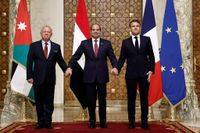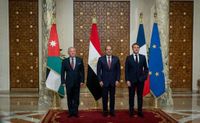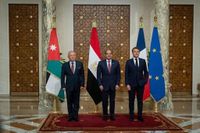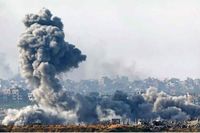On April 7, 2025, the leaders of France, Egypt, and Jordan convened in Cairo to address the escalating crisis in Gaza, a region that has been embroiled in conflict for 18 months. French President Emmanuel Macron, Egyptian President Abdel Fatah al Sisi, and Jordanian King Abdullah II emphasized the urgent need for a political solution that would see the Gaza Strip governed exclusively by a strengthened Palestinian Authority following the cessation of hostilities.
The summit was marked by a clear rejection of any future role for Hamas in Palestinian governance. In a joint declaration, the leaders asserted, "Governance, law and order, and security in Gaza, as well as in all Palestinian Territories, must be the exclusive responsibility of a strengthened Palestinian Authority, supported by regional and international bodies." Macron reiterated that Hamas must cease to be a threat to Israel, highlighting the need for a stable and peaceful environment in the region.
The meeting followed a four-way phone call that Macron organized with U.S. President Donald Trump and the other leaders, aimed at discussing measures to ensure a permanent ceasefire in Gaza. According to the Elysee Palace, the call was initiated to address the dire humanitarian situation in the enclave, where the need for aid has become increasingly urgent.
During the summit, the leaders called on the international community to exert pressure on Israel to restore the ceasefire that had been broken on March 18, 2025. They emphasized the importance of resuming humanitarian aid and implementing all phases of a ceasefire agreement, which they believe are critical to alleviating the suffering of the 2.4 million inhabitants of Gaza, many of whom have been displaced due to ongoing violence.
Macron also expressed support for a reconstruction plan put forth by Egypt and endorsed by the Arab League, which aims to facilitate the rebuilding of Gaza after the conflict. He described the plan as a "realistic approach to reconstruction" that should pave the way for a new governance structure in the region, one led by the Palestinian Authority rather than Hamas.
The leaders' statements came against the backdrop of a deteriorating situation in the West Bank, where they called for an end to unilateral measures by Israel that undermine the prospects for a Palestinian state. They expressed concerns over the ongoing violence and the need for protection of civilians and humanitarian workers, which are obligations under international law.
In addition to discussing the Gaza situation, the leaders addressed the broader implications of the conflict, including its impact on regional stability. King Abdullah II warned that continuous Israeli attacks on Gaza threaten to plunge the entire region into chaos, undermining diplomatic and humanitarian efforts to resolve the crisis.
The summit also underscored the importance of maintaining the status quo at holy sites in East Jerusalem, particularly amid increasing tensions due to incursions by far-right Jewish groups. The leaders reiterated their rejection of any plans to forcibly displace Palestinians from their ancestral lands, asserting that such actions would violate international law.
In a press conference following the summit, Macron and al Sisi highlighted the necessity for the international community to support a comprehensive plan for Gaza's reconstruction, which is estimated to cost over $53 billion according to the United Nations. They called for a united front to ensure that any future governance in Gaza is representative of the Palestinian people and free from the influence of Hamas.
The tripartite meeting in Cairo reflects a growing consensus among Arab leaders regarding the need for a political solution to the ongoing conflict in Gaza. With Macron's visit to Egypt, which is part of a three-day diplomatic effort, the leaders aim to foster collaboration and support for a peaceful resolution to the crisis.
As the situation in Gaza continues to evolve, the leaders of France, Egypt, and Jordan remain committed to working together to facilitate a path toward stability and peace in the region. Their joint efforts underscore the importance of international cooperation in addressing the humanitarian and political challenges posed by the conflict.
In conclusion, the April 7 summit marks a significant step in the ongoing dialogue surrounding the Gaza crisis, with leaders advocating for a renewed commitment to peace, humanitarian aid, and the establishment of a viable Palestinian state. As the international community watches closely, the hope remains that these discussions will lead to meaningful progress in resolving one of the most enduring conflicts in the Middle East.








